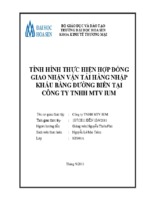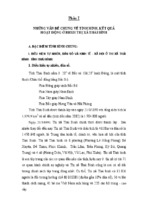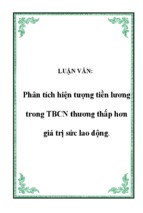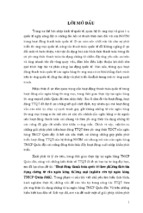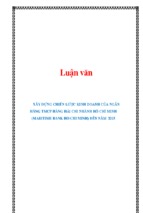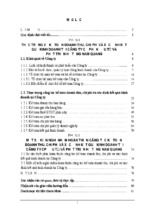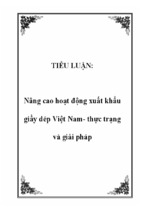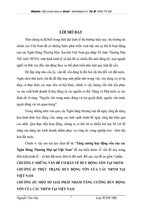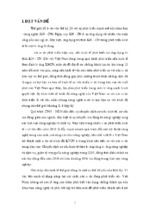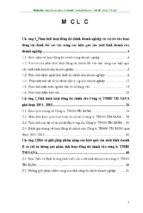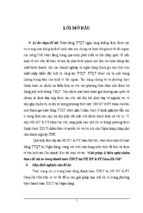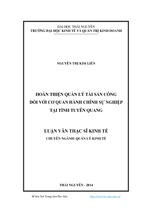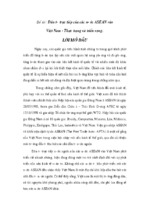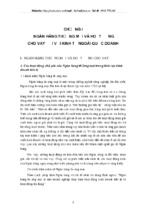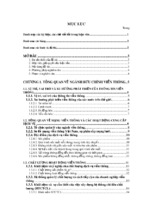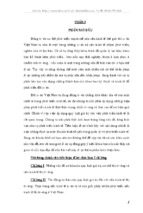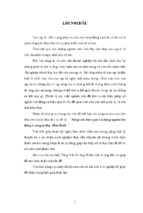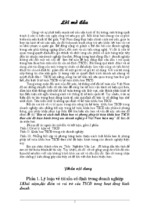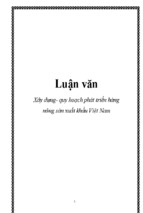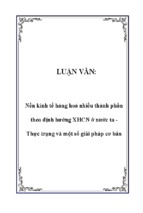Website: http://www.docs.vn Email :
[email protected] Tel : 0918.775.368
National Economics University
Faculty of foreign languages
Department of business English
Sự định nghĩa kiểu: Mục lục 1:
Phông: 17 pt, Dừng tab: 16 cm,
Phải,Đằng trước: … + Không có tại
15.48 cm
Sự định nghĩa kiểu: Mục lục 2:
Phông: 16 pt, Không soát chính tả h
ngữ pháp, Dừng tab: 16 cm,
Phải,Đằng trước: …
Sự định nghĩa kiểu: Mục lục 3:
Phông: 15 pt, Không Đậm, Dừng tab
16 cm, Phải,Đằng trước: … + Không
tại 15.48 cm
REPORT:
Đã định dạng: Giãn cách dòng: 1.
dòng
Theory and practical application of nominal clauses,
adverbial clauses, direct & indirect speech in finance
Supervisor : Pham Thi Thanh Thuy
Group members : Truong Thu Hang (CQ503703)
Luu Dieu Ly (CQ503742)
Pham Thi Kim Chung (CQ503679)
_Ha Noi 2010_
Đã định dạng: Dừng tab: 6.98 cm
Trái + 7.3 cm, Trái
OUTLINE
A. Introduction .............................................................................. 1
B. Development .............................................................................. 2
I. Literature review ..........................................................................2
Đã định dạng: Dừng tab: Không có
tại 15.98 cm
NOMINAL CLAUSES ....................................................................... 2
ADVERBIAL CLAUSES ................................................................... 8
DIRECT AND INDIRECT SPEECH ................................................ 14
III.Practical application .................................................................21
1. Contrast the use of nominal clauses and adverbial clauses in
Đã định dạng: Dừng tab: Không có
tại 15.98 cm
Đã định dạng: Mục lục 3
finance .............................................................................................. 21
3. Contrast the use of direct speech and indirect speech in finance .... 34
C. Conclusion ............................................................................... 46
D. Appendix ................................................................................. 47
I. References ....................................................................................47
Đã định dạng: Dừng tab: Không có
tại 15.98 cm
II. Discourses ( from Finance Times) ...........................................47
Đã định dạng: Dừng tab: 16 cm,
Phải,Đằng trước: …
A.Introduction
B.Development
I.Literature reviews
1.Nominal clauses
2.Adverbial clauses
3.Direct & indirect speech
II.Practical application
1.Nominal clauses & adverbial clauses in finance
2.Direct & indirect speech in finance
C.Conclusion
D.Appendix
Đã định dạng: Dấu và số đầu dòng
Đã định dạng: Thụt lề: Treo: 4.66
cm, Đánh số + Mức: 1 + Kiểu Đánh
I, II, III, … + Bắt đầu từ: 1 + Căn
chỉnh: Phải + Căn cách: 3.7 cm + T
sau đó: 6.24 cm + Thụt lề: 6.24 cm
Dừng tab: Không có tại 6.24 cm
Đã định dạng: Thụt lề: Trái: 1.59
cm, Treo: 0.32 cm, Đánh số + Mức:
+ Kiểu Đánh số: I, II, III, … + Bắt đ
từ: 1 + Căn chỉnh: Phải + Căn cách:
3.7 cm + Tab sau đó: 6.24 cm + Th
lề: 6.24 cm, Dừng tab: Không có tạ
6.24 cm
I. References
II. Discourses
1
A. Introduction
Đã định dạng: Ở tâm
Đã định dạng: Không Đầu trang kh
với trang đầu tiên
The complex sentence is an important part of English grammar, not only
for its popular application but also for its complicated structures. Among
knowledge involved in the complex sentence, there are nominal clauses,
adverbial clauses, direct and indirect speech. This report looks into these matters
by including two main sections. The first section focuses on literature reviews
for the definition and usage of nominal clauses, adverbial clauses, direct and
indirect speech. The other section deals with practical applications of these
theories in finance- an aspect of business. This section contrasts the use of
nominal clauses and adverbial clauses, direct and indirect speech in the financial
theme by analyzing five financial articles to help you thoroughly understand the
theory. Moreover, the report is carried out by some useful research methods
such as getting theories from orthodox English grammar books and collecting
additional examples from international e-newspapers in the Internet. We do
hope that the report will provide readers useful information and practically assist
readers in studying and using English.
Đã định dạng: Màu phông: Tự độn
2
Đã định dạng: Ở tâm
B. Development
I. Literature review
NOMINAL CLAUSES
1.Definition
A nominal clause is a subordinate clause that functions as a noun
Đã định dạng: Màu phông: Tự độn
Đã định dạng: Màu phông: Tự độn
phrase. For example:
“What we are talking about today is the complex sentence.”
“Do you know whether this shirt costs much or not?”
In the above example, what we are talking about today and whether this
Đã định dạng: Màu phông: Tự độn
shirt costs much or not are nominal clauses and they function as noun phrases.
In details, what we are talking about today functions as a subject and whether
this shirt costs much or not functions as a direct object.
2. Classification
According to syntax, nominal clauses can be divided into two main types:
finite nominal clauses and non-finite nominal clauses. For the finite nominal
clauses, there are four subtypes: that-clause, wh-interrogative clause, yes-no
interrogative clause and nominal relative clause. For the non-finite nominal
clauses, there are three subtypes: to- infinitive nominal clause, V_ing nominal
Đã định dạng: Màu phông: Tự độn
clause and bare- infinitive nominal clause.
2.1. Finite nominal clauses
a. That- clause
That- clause is made by the conjunction “that” and a clause. For example,
“English is that this course improves.”
When the clause performs function of object or complement, or when the clause
is brief and uncomplicated, the conjunction “that” can be omitted. In this case,
we call it the zero that- clause. For example:
I told him (that) he was wrong.
Đã định dạng: Màu phông: Tự độn
3
However, when the clause is subject, that can not be omitted and is
usually expanded to the fact that, except in very formal English.
(The fact) that she got mark ten surprised everybody.
Also, when the complex sentence is loaded with adverbials and
modifications, that is obligated to appear.
Mrs Thuy told us, to our regret, that we must take the final exam.
In the above, to our regret is an adverbial, and the omission of that will make
the sentence unclear.
b. Wh- interrogative clause
Wh-interrogative clauses resemble wh-question in that they leave a gap
of unknown information, represented by the wh-element. For example:
We are curious about who will win the miss NEU this year.
In the example , who will win the miss NEU this year is a wh- interrogative
clause. It concludes the wh- word who, and the whole clause functions as a
prepositional complement.
An infinitive wh-clause can be formed with all wh-words except why.
For example, the sentence “I don‟t know how one must pronounce this word”
can be rewritten as “I don‟t know how to pronounce this word.” However, we
can not rewrite the sentence “The small child wonders why he ought to brush his
teeth before going to bed” as “The small child wonders why to brush his teeth
before going to bed”.
c. Yes-no interrogative clause
The dependent yes-no interrogative clause is formed with if or whether.
I don‟t know if/ whether they accept my application.
The dependent alternative question has if/ whether ...or:
He doesn‟t care whether she loves him or not.
I am not sure if it will rain or be sunny.
A clause beginning with whether cannot be made negative, except as the
second part of an alternative question. For example, we can say “She asked me if
Đã định dạng: Ở tâm
4
class grammar 1 doesn‟t have many boys” but we can not say “She asked me
whether class grammar 1 doesn‟t have many boys”. However, we can make it
more reasonable by changing it into “She asked me whether class grammar 1
has many boys or (whether it does) not”.
One more note is that if can not introduce a subject clause. For example,
it is untrue to say “if it is expensive or not doesn‟t concern me” because it is
expensive or not functions as a subject here. We can use whether instead.
d. Nominal relative clause
The nominal relative clause is also introduced by a wh-element like whinterrogative clause. However, in fact, the nominal relative clause is much closer
to noun phrase status than other nominal clauses are. It can normally be
paraphrased by a noun phrase containing a nominal element & a post modifying
relative clause. For example:
We remember when we first came here.
Whoever told you that was not telling the truth.
Definitely, the nominal relative clause when we first came here can be
paraphrased as the noun phrase the time when we first came here including the
nominal element the time and the post modifying relative clause when we first
came here. Likewise, in the second example, whoever told you that can also be
paraphrased as anyone who told you that.
There is a difference between UNIVERSAL and DEFINITE meaning as
expressed by the wh-form of a relative clause: universal meaning is made by whword +ever (whoever ,whatever, whenever.....), definite meaning is made by whword(who ,what, when..). Coming back to the two example above, the first is
paraphrased in universal term (the time) while the second is paraphrased in
definite term (anyone).
2.2. Non- finite nominal clauses
a. To- infinitive nominal clause
Đã định dạng: Ở tâm
5
For the neighbors to sell their house would be a mistake.
Ly‟s dream is to be fatter.
In the examples, both for the neighbors to sell their house and to be fatter are toinfinitive clauses that perform the function of noun phrases.
The subject of a to-infinitive clause is normally preceded by for
(which is perhaps acting here more as a conjunction than as a preposition).
For example, “The plan is for us to finish this term next week”.
However, when the clause is a direct object, the for is omitted like in
“Everyone wants me to talk louder”.
b. V_ing nominal clause (also participle clause)
The commonest type of participle clause is the participle clauses without
subject.
Thu is responsible for checking our participation.
In the other case, when the participle clause requires a subject ,we use
genitive case in formal style or objective case in informal style. For examples:
Bau‟s friends are surprised at his changing to new hair style.
or
Bau‟s friends are surprised at him changing to new hair style.
However, the genitive is particularly unsuitable when the subject is an
inanimate or abstract noun phrase or a „group‟ genitive phrase. For instance, the
sentence “She is upset about her marriage‟s ending in a divorce” is not suitable
because her marriage is an abstract noun phrase. Another note is that a pronoun
in the objective case shouldn‟t be used in subject position. For example, it is
very informal to say “Him singing in the shower is an interesting hobby”.
c. Bare- infinitive nominal clause
When the to of the infinitive is omitted, it is called bare- infinitive. The
bare- infinitive nominal clause is used when the infinitive clause supplies a
predication corresponding to an use of the proverb do. For example, “The thing
parents often do in Tet holiday is (to) buy their children new clothes”. Besides,
Đã định dạng: Ở tâm
Đã định dạng: Màu phông: Tự độn
6
Đã định dạng: Ở tâm
another situation in which we use bare- infinitive is that when the infinitive
clause is initial.
3. Function
According to syntax, nominal clauses can be used in 8 functions: subject
(S), direct object (Od), subject complement (Cs), appositive (App), prepositional
complement (Cprep), object complement (Co), adjectival complement (Cadj)
and indirect object (Oi). However, not all the types of nominal clauses can
perform all these functions. In fact, there are some major functions that all types
can perform and some minor functions that are restricted to a certain type only.
3.1. Subject (major function)
Nominal clauses firstly function as grammatical subjects which perform the
action of or act upon the verb. For example, “That „Thi No‟ gave „Chi Pheo‟ a
bowl of rice gruel with onions made him fall in love with her”. Easily to see, all
the that- clause functions as the subject that performs the action of making him
fall in love with her.
3.2. Direct object (major function)
Nominal clauses secondly function as direct objects that follow and receive
the action of transitive verbs. For example, “Some teachers had been wondering
if they chose the right career”.
3.3. Subject complement ( major function)
A nominal clause can also perform the function of subject complement in
which it follows copular verbs and describes the grammatical subject. For
example, “The thief will be whoever has blue ink on their hands”. Here the
Wh- interrogative nominal clause functions as the subject complement of the
thief.
Đã định dạng: Màu phông: Tự độn
7
Đã định dạng: Ở tâm
3.4. Appositive (major function)
All types of nominal clause can also functions as an apposition means that
they identify some subjects. For example, “Her dream, to be a famous singer,
Đã định dạng: Màu phông: Tự độn
was never fulfilled”. In this example, the to- infinitive clause to be a famous
singer identifies the subject her dream and makes it clearer.
3.5. Prepositional complement (minor function)
Some types of nominal clauses like wh- interrogative, yes-no interrogative ,
nominal relative, V_ing clauses can perform the function of prepositional
complement when directly following a preposition and completing the meaning
Đã định dạng: Màu phông: Tự độn
of a prepositional phrase. For instance, “The students are thinking about what
they just learned in class”. Here the prepositional phrase thinking about is
modified by the italic wh- interrogative clause.
3.6. Object complement (minor function)
Nominal relative clause is the sole type can perform as an object
complement when directly follows and describe the direct object. In the sentence
“You may call me whatever names you like”, the nominal relative clause
describes the direct object me.
3.7. Adjectival complement (minor function)
Almost all types of nominal clause, except for nominal relative clause, can
function as adjectival complements that complete the meaning of adjectives. For
example, “I am glad to welcome you to my house” includes the to- infinitive
nominal clause that completes the meaning of the adjective glad.
3.8. Indirect object (minor function)
Only the nominal relative clause can perform as an indirect object or
meanwhile, it can indicate to or for whom or what the action of a intransitive
verb is performed. We can see this function in the example “Have you given
how you want to decorate your new room any thought?”
Đã định dạng: Màu phông: Tự độn
Đã định dạng: Ở tâm
8
ADVERBIAL CLAUSES
1. Definition:
Adverbial clauses is a dependent clauses which function as adverb phrases
Đã định dạng: Thụt lề: Trái: 0 cm,
Treo: 0.32 cm, Đánh số + Mức: 1 +
Kiểu Đánh số: 1, 2, 3, … + Bắt đầu t
1 + Căn chỉnh: Phải + Căn cách: 0 c
+ Thụt lề: 0.63 cm
indicating time, place, condition, time, and purpose. They appear in positions
typical of adverb phrases (initial, medial, and final). ( the definition in
Language, grammar, and communication course book ).
2. Classification:
According to structural classification, adverbial clauses can be divided into
Đã định dạng: Thụt lề: Trái: 0 cm,
Treo: 0.32 cm, Đánh số + Mức: 1 +
Kiểu Đánh số: 1, 2, 3, … + Bắt đầu t
1 + Căn chỉnh: Phải + Căn cách: 0 c
+ Thụt lề: 0.63 cm
three types.
2.1. The first type is finite adverbial clauses. In terms of meaning (or semantic
classification of these), there exists eleven types namely:
1. Clauses of time.
2. Clauses of place.
3. Clauses of condition.
4. Clauses of concession.
5. Conditional consessive clauses
6. Clauses of reason or cause.
7. Clauses of circumstance.
8. Clauses of manner
9. Clauses of comparison.
10. Clauses of result.
11. Clauses of proportion and preference.
Now we go to the big more detail:
Subclassification
Surbodinators and
Examples
joining words
Clause of time
After, before, since,
When I last saw
until, when, while, as
Chung, she looked
soon/long as, whenever more beautiful than
Đã định dạng
Đã định dạng: Ở tâm
9
Clauses of place
and so on
now.
Where / wherever
Where I am study
Grammar lesson I see
many intelligent
students.
Clauses of condition
If(positive condition),
a) Real condition:
( state the dependence of
unless(negative
leaves unsolved
one circumstance or set of
condition), on
the question of
circumstances on other)
condition that,
the fulfilment or
provided (providing)
non fulfilment of
that, as long as, so long
the condition,
as
and so the truth
of the
proposition
expressed by the
main clause.
If I am rich, I will buy
a Mescedes car.
Unless clause
often lays stress
on the escluded
positive option.
Unless the weather is
wonderful, I will not
go to school.
b) Unreal
condition: is
clearly expected
Đã định dạng
Đã định dạng: Ở tâm
10
that the
condition will
not be fulfilled.
If I were 6 years old, I
would receive a lot of
money. (unreal in
present).
If we had not passed
the examination, we
would not have sit here
now. (unreal in the
past).
Unless clauses
are not usually
unreal condition
If only is to
express a wish:
If only I were beautiful,
I became a Miss
World.
Clauses of concession.
Although, though, even Although I am not
( show contrast between
if, even though, while,
intelligent, I am
two circumstances)
whereas
hardworking.
Conditional and concessive
Whether...or,
clauses
wherever, whatever,
conditional
whoever, no matter
concessive
how
clause:
a) Alternative
Đã định dạng: Ở tâm
11
Whether we satisfy
Ms.Thuy or not, we
will feel pleased.
b) Universal
conditional
concessive
clause:
No matter how hard I
try, I can not be as high
as Hang.
Clauses of reason or cause
As, because, since
Hang is very proud
because she is very
high.
Clauses of circumstance
Because, since, now
Seeing that students
that, seeing, that
are so sleepy, I need
talk more attractively.
Clauses of manner
(Exactly) as, just as
Please pay attention as
our presentation is
very interesting.
Clauses of comparison
As if, as though
He treats me as if he
had never met me
again.
Clauses of result
So that, in order that
I stand here so that
every students can see
me clearly.
Clause of proportion and
As...so, the more/the
The more careful I
preference.
less... the more/ the
prepare, the more
( show the equivalence or
less
confident I feel.
Đã định dạng
12
degree between two
circumstance)
2.2. Non-finite adverbial clauses
a. To-infinitive clauses: often introduced by (in order) to, so as to. infinitives
thus used often function as A purpose:
I come early to prepare for our presentation.
Sometimes, to infinitive can act as A result:
This topic is too difficult to understand.
b. V-ing participle clauses: -ing participle clauses are very common with
subordinator such as while, without, when, etc. in the following:
A time: some students take notes when listening to our presentation.
A circumstance: the asmosphere having improved, I feel better.
A manner: she entered the room without greeting anyone inside.
A reason: being a student, I have to go to school on time.
A preference: rather than talking so much, I preferred to sing a song.
A condition and concession: whether singing or not, I am still pleased.
c. V-ed participle clauses:
A time: once promised, I never forget.
A place: wherever possible, such facts have been reported
A condition: these books will cause great harms to young students unless
forbidden.
d. Bare infinitive clauses
A preference: rather than read books, you should listen to our
presentation.
2.3. Verbless adverbial clauses:
They include:
a. Adjectival contingent clauses (without or with subordinator):
Đã định dạng: Ở tâm
13
Đã định dạng: Ở tâm
A circumstance: I went home dead tired.
A reason: Chung, surprising at her mark, shouting loudly
A concession: though very poor, I am extremely generous
A condition: if necessary, I will sing a song.
A time: when rich, I will travel all over the world.
b. Other clauses: often with subordinator
When in Rome, do as Rome does.
While in London, he enjoyed himself greatly.
These verbless clauses are often considered as reduced finite clauses with
ellipted subject and verb.
Đã định dạng: Màu phông: Tự độn
14
Đã định dạng: Ở tâm
DIRECT AND INDIRECT SPEECH
1. Definition
Direct speech (sometimes called quoted speech) says exactly what someone
Đã định dạng: Màu phông: Tự độn
has said. Especially, in our writing, what a person says appears within quotation
marks ("...") and should be word for word.
For example: Ly said: “ Today‟s lesson is about the complex sentence”.
Or it can be written: “ Today‟s lesson is about the complex sentence” She said.
In the example above, “Today‟s lesson is about the complex sentence” is
direct speech because it is appeared within quoted mark and it says exactly what
Ly has said.
Indirect speech (also referred to as 'reported speech') refers to a sentence
reporting what someone has said. It is almost always used in spoken English.
For example: Lan said that that day‟s lesson was about the complex
sentence.
As you can see, the clause after “That” is indirect speech because it is
reported what Lan has said. Therefore, the tense has been changed to be
suitable with the moment of speaking. In detail, in this context, the moment of
seaking is in the past, so the tense must be changed from the present tense is to
past tense was.
2. Methods of changing from Direct to Indirect speech
There are three main steps of changing from direct to indirect speech:
Đã định dạng: Màu phông: Tự độn
Change of the verb forms, Change pronouns and pointer word, Clause status.
a. Change the verb forms:
When the reporting verb is in the present tense, there is not any change in
the suborndinate clause in Indirect speech as compared to the independent
clause in Direct speech in terms of tense and aspects form. You can see it clearly
in those examples:
The first example: He says “ my mother is cooking dinner”
He says his mother is cooking dinner.
Đã định dạng: Màu phông: Tự độn
15
Đã định dạng: Ở tâm
The second example: He says “ I drew this picture in the night”
He says he drew that picture in the night.
When the reporting verb is in the past tense (asked/ thought/ wonder…),
reporting speech the tense usually changes. This is because when we use
reported speech, we are usually talking about a time in the past (because
obviously the person who spoke originally spoke in the past). The verbs
therefore usually have to be in the past too.
As a rule when you report something someone has said you go back a
Đã định dạng: Màu phông: Tự độn
tense, called back-shift (the tense on the left changes to the tense on the right):
Đã định dạng
present simple
past simple
I'm a teacher.
He said he was a teacher
Đã định dạng: Màu phông: Tự độn
past continuous.
Đã định dạng: Màu phông: Tự độn
Đã định dạng: Màu phông: Tự độn
present continuous
I'm having lunch with my parents.
present perfect simple
I've been to France three times.
present perfect continuous
I've been working very hard.
past simple
I bought a new car.
past continuous
It was raining earlier.
Đã định dạng: Màu phông: Tự độn
He said he was having lunch
with his parents.
past perfect simple
Đã định dạng: Màu phông: Tự độn
Đã định dạng: Màu phông: Tự độn
He said he had been to France
three times.
past perfect continuous
Đã định dạng: Màu phông: Tự độn
Đã định dạng: Màu phông: Tự độn
He said he had been working
very hard.
past perfect
Đã định dạng: Màu phông: Tự độn
Đã định dạng: Màu phông: Tự độn
He said he had bought a new
car.
past perfect continuous
Đã định dạng: Màu phông: Tự độn
Đã định dạng: Màu phông: Tự độn
He said it had been raining
earlier.
16
Đã định dạng: Màu phông: Tự độn
past perfect
past perfect
The play had started when I
Đã định dạng: Màu phông: Tự độn
NO CHANGE POSSIBLE
arrived.
Đã định dạng: Màu phông: Tự độn
past perfect continuous
I'd already been living in London
for five years.
Đã định dạng: Ở tâm
past perfect continuous
Đã định dạng: Màu phông: Tự độn
NO CHANGE POSSIBLE
Note: The tenses will not change if the statement is still relevant or if it is a
Đã định dạng: Màu phông: Tự độn
universal truth. We can often choose whether to keep the original tenses or
change them.
For example: The teacher said: “ The earth goes around the sun”
The teacher said that the earth goes around the sun.
Other verb forms also sometimes change:
will
I'll come and see you soon.
would
Đã định dạng: Màu phông: Tự độn
Đã định dạng: Màu phông: Tự độn
He said he would come and see me
soon.
can
could
I can swim under water for
He said he could swim under water
two minutes.
for two minutes.
must
had to
Đã định dạng: Màu phông: Tự độn
Đã định dạng: Màu phông: Tự độn
Đã định dạng: Màu phông: Tự độn
Đã định dạng: Màu phông: Tự độn
All tickets must be bought in He said that all tickets had to be
advance.
bought in advance.
shall
should
What shall we do about it?
He asked what we should do about it.
may
might
May I smoke?
He asked if he might smoke.
Đã định dạng: Màu phông: Tự độn
Đã định dạng: Màu phông: Tự độn
Đã định dạng: Màu phông: Tự độn
Đã định dạng: Màu phông: Tự độn
17
Đã định dạng: Ở tâm
You should remember that there is no change to: could, would, should,
might and ought to.
b. Change pronouns and pointer word:
Đã định dạng: Màu phông: Tự độn
Pronoun in indirect speech should be changed in accordance with the
relationship between them and those of the reporting clause subject.
For example: He said, “ I do not believe you”
He said to me that he didn‟t believe me.
“We didn‟t agree with his decision” She said to him
She told him that they didn‟t agree with his decision.
Adverbial of time and place and determiners should also change as follow:
now
then
today
that day
here
there
this
that
this week
that week
the following day
tomorrow
the next day
the day after
the following week
next week
the next week
the week after
yesterday
last week
the previous day
the day before
the previous week
the week before
Đã định dạng

